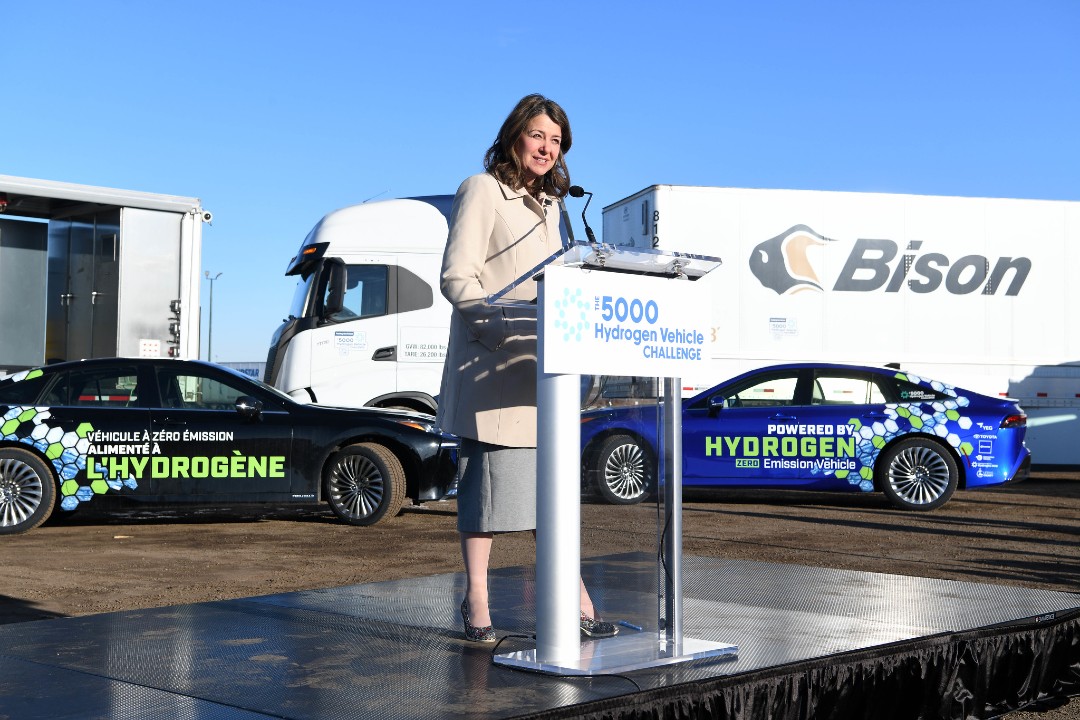The Alberta Motor Transport Association is working to bring back a 700-bar hydrogen fuelling station to Alberta as part of its ongoing push to decarbonize the province's trucking industry, for which it serves as a member organization.
"(Having) 700 bar in Alberta would change the game for hydrogen vehicles," Terri Johnson, the manager of industry advancement at AMTA, told Taproot. "If we were able to get 700 bar, that would fill an entire new ecosystem strand."
While the AMTA doesn't build hydrogen refuelling stations itself, in 2024, it helped facilitate the construction of a 700-bar Nikola-branded station at Blackjacks Roadhouse in Nisku. But the station was not long for the world. In February, it closed after less than a year in operation, after Nikola filed for bankruptcy, and as Taproot reported, its hardware was shipped back to the United States.
Johnson said it might now be easier to build a hydrogen refuelling station versus the first attempt because the Alberta government has since created a guidebook for anyone building them, with detailed steps for completion and a checklist. "We are looking to bring one of those (700-bar) stations back," Johnson said. "Some of the project partners that were involved in the original project (are in negotiations now)."
The two common types of hydrogen refuellers for vehicles are 350 bar and 700 bar, which are measurements of pressure (atmospheric pressure, for comparison, is about one bar). Heavy-duty vehicles that use hydrogen tend to use 350-bar refuellers, while 700-bar refuellers are commonly used for lighter-duty vehicles, according to Hyfindr, a B2B marketplace for the hydrogen economy. The caveat is that heavy-duty trucks aiming for longer range between fills are trending toward 700-bar technology, Hyfindr reports.
Robert Harper, the president of AMTA, told Taproot the higher pressure from a 700-bar refueller allows for hydrogen fuel-cell vehicles to run more efficiently and "strengthens" the fuel cell. "It's not a linear amount of energy you produce when the pressure is higher. You get an exponential output of energy. That's why having a higher pressure is important for running long, heavy vehicles. You can get a better distance and more energy with the same amount of hydrogen."
Alberta's future adoption of hydrogen fuel will require options, Johnson said. "I would say what's essential for hydrogen adoption is fuelling, period. At 350 (bar), we can understand the technology. (But) in order for carriers to adopt (hydrogen fuel), we will need the 700-bar fuelling."
Hydrogen fuel matters to AMTA, Johnson added, because switching to it can help decarbonize the Class 7 and Class 8 vehicles the association focuses on. She said transportation is the province's sector with the highest carbon emissions, that road transportation makes up 80% of those emissions, and that heavy-duty transportation takes up 51% of the fuel used in transportation. "Heavy-duty transport is really that low-hanging fruit for decarbonization," she said.
The association is currently partnering with Transport Canada and Deloitte on the Zero Emission Truck Testbed project to test three hydrogen fuel Class 8 trucks for routes in Alberta and one battery-electric Class 8 truck for trips between Surrey and Mount Vernon, WA. Last winter, a hydrogen fuel-cell vehicle completed a round-trip trek between Edmonton and Calgary on a single tank. It was a success for hydrogen and trucking, Johnson said, noting the trip used only 61% of the truck's hydrogen tank.
Calgary is high on AMTA's priority list for new fuelling stations to make commercial trucking with hydrogen fuel more viable, Johnson said. In May, the city launched its equivalent to the Edmonton Region Hydrogen HUB. A representative with the hub told Taproot that Calgary has no hydrogen fuellers aside from one at Canadian Pacific Kansas City, which only fuels its trains. The nascent hub will examine a path forward for hydrogen fuel during an Aug. 28 webinar.

